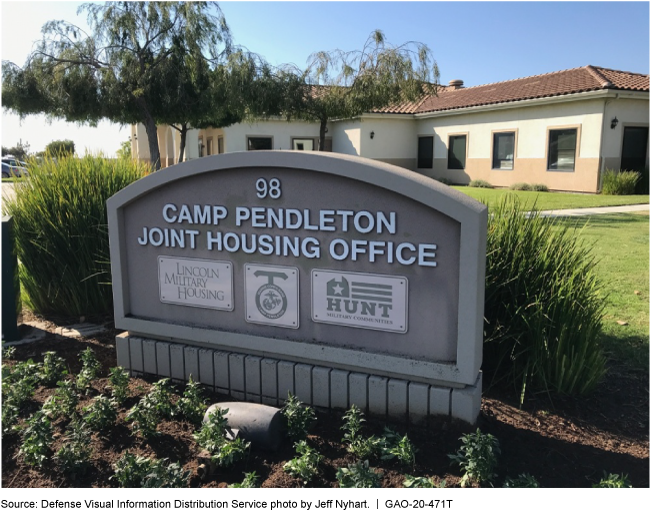Military Housing: Preliminary Recommendations to Strengthen DOD's Oversight and Monitoring of Privatized Housing
Fast Facts
Private-sector companies build, renovate, and maintain about 99% of family housing at military bases in the United States. However, with reports of hazards like mold and pest infestations, there are concerns about how well DOD monitors the condition of this housing.
We testified about our ongoing work in this area. Military departments have increased their monitoring of privatized housing conditions, but we found they don’t have reliable data on housing maintenance or resident satisfaction.

Camp Pendleton
Highlights
What GAO Found
The Office of the Secretary of Defense (OSD) and the military departments conduct a range of oversight activities, but some of these activities have been more extensive than others. Specifically, GAO's draft report notes:
- The military departments conduct some oversight of the physical condition of housing, but some efforts have been limited in scope. Military departments have authority to conduct oversight of the condition of privatized housing; that oversight generally consists of reviewing a sample of work order requests, visual inspections of housing during change of occupancy, and other point in time assessments. However, GAO found that these efforts are limited in scope. For example, annual interior walk-throughs are limited to just a few homes at some installations, which may not comprehensively reflect the condition of the housing units at those installations.
- Military departments use performance metrics to monitor private partners, but metrics do not provide meaningful information on the condition of housing. OSD has recently issued guidance to ensure consistency in the framework used to measure project performance. However, the specific indicators used to determine if the metrics are being met do not accurately reflect private partner performance related to the condition of the home. For example, a common indicator is how quickly the private partner responded to a work order, not whether the issue was actually addressed.
- The military departments and private partners collect maintenance data on homes, but these data are not captured reliably or consistently. The Department of Defense (DOD) is expanding its use of work order data to monitor and track the condition of privatized housing. However, based on GAO's analysis of data provided by all 14 private partners, these data cannot reliably be used for ongoing monitoring of privatized housing because of data anomalies and inconsistent business practices in how these data are collected.
- DOD provides reports to Congress on the status of privatized housing, but some data in these reports are unreliable, leading to misleading results. DOD provides periodic reports to Congress on the status of privatized housing, but reported results on resident satisfaction are unreliable due to variances in the data provided to OSD by the military departments and in how OSD has calculated and reported these data.
OSD and the military departments have made progress in developing and implementing a series of initiatives aimed at improving privatized housing. In addition, Congress established several requirements addressing privatization housing reform. However, DOD officials and private partner representatives have identified challenges that could affect implementation of these various initiatives. These include concerns that implementation could have unintended negative impacts on the financial viability of the privatized housing projects.
Why GAO Did This Study
Congress enacted the Military Housing Privatization Initiative in 1996 to improve the quality of housing for servicemembers. DOD is responsible for general oversight of privatized housing projects. Private-sector developers are responsible for the ownership, construction, renovation, maintenance, and repair of about 99 percent of military housing in the United States. Recent reports of hazards, such as mold and pest infestation, have raised questions about DOD's oversight.
This statement summarizes GAO's draft report on privatized housing, which is currently at DOD for review and comment. Specifically, the statement discusses, among other objectives, OSD and the military departments' (1) oversight of privatized military housing and (2) development and implementation of initiatives to improve privatized housing. For its draft report,
GAO reviewed policies and guidance; visited a non-generalizable sample of 10 installations representing each military department, among other factors; analyzed work order data; and interviewed DOD officials and private partner representatives.
Recommendations
GAO's draft report includes several recommendations, including that DOD take steps to improve housing condition oversight, performance metrics, maintenance data, and resident satisfaction reporting as well as to assess the risk of initiatives on project finances.
